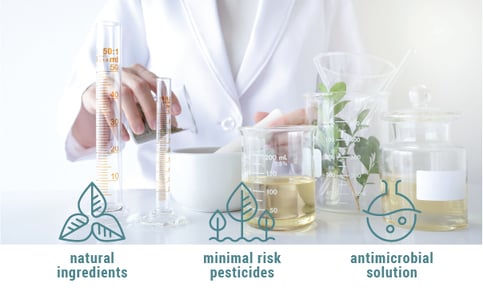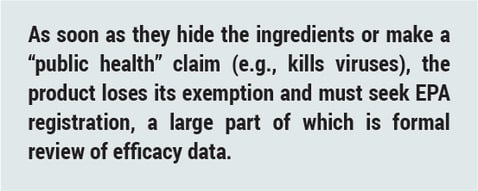- Home
- Services
- Hi-Line Engineering
- About
- Careers
- Contact
- Requests For Proposals
Exempt Disinfectants - Fact or Fiction?
by GDS Associates, Inc | July 31, 2020 | News , Environment & Safety
The product claims sounded great:
“Formulated with all natural ingredients.”
“Shown to neutralize viruses and bacteria in a laboratory environment.”
“So safe its’ ingredients are US EPA Exempt from registration under the minimal risk pesticide FIFRA section 25(b).”
“Antimicrobial multi-surface cleaning solution for fighting and killing germs, bacteria, and viruses that can be spread throughout the air or on surfaces.” 
Perhaps best of all was the assurance that after application, the product would continue to kill microbes, including the SARS-CoV-2 virus, for 72 hours. The exact formula was withheld as “Propriety / Trade Secret Claimed” on both the Safety Data Sheet and the product literature, but the product website provided efficacy test data for human pathogens such as Human Coronavirus, HIV-1, Hepatitis C, Legionella, MRSA and others. Based on all of this vendor-provided data, it looked pretty solid, except for, well, everything.
FIFRA does provide exemption from EPA registration in Subpart B (40 CFR 152.25) for minimum risk pesticides that contain what we might refer to as “natural ingredients” such as cedarwood oil, citronella, corn oil, peppermint, salt, thyme oil and numerous others. However, these exempted pesticides must meet six conditions, including that all of the ingredients must be listed on the label (no trade secrets allowed) and that the product “must not bear claims either to control or mitigate organisms that pose a threat to human health”. As soon as they hide the ingredients or make a “public health” claim (e.g., kills viruses), the  product loses its exemption and must seek EPA registration, a large part of which is formal review of efficacy data. As for the claim of continuing to kill for 72 hours, this is simply false. There are no products, either exempt or currently on List N, that can legally make such a claim.
product loses its exemption and must seek EPA registration, a large part of which is formal review of efficacy data. As for the claim of continuing to kill for 72 hours, this is simply false. There are no products, either exempt or currently on List N, that can legally make such a claim.
Exempt products such as the one described here can only legally claim to control the growth of algae (e.g., fish tanks), odor-causing bacteria, bacteria that cause spoilage or fouling (e.g., cooling towers, paint) or mold and to clean these types of agents from food contact surfaces. Anything more than that is simply untrue and is not allowed by federal law.
With demands for disinfectants at an all-time high, it is more important than ever to know exactly what you are buying and using. Unfortunately we cannot rely on the integrity of many of the salespersons and others pushing solutions that egregiously violate federal law and will not work. If you do not feel qualified to make detailed evaluations, contact a trusted advisor who can. There are many excellent products from which to choose, and you just have to be able to sort though the noise and chaos to get to them.
ABOUT THE AUTHOR:
 Scott Harris, PhD is the Associate Director of EHS Services in the Austin, TX office of GDS Associates, Inc. and an adjunct faculty at University of Texas at San Antonio, University of Utah and UNC-Chapel Hill. Dr. Harris received his PhD in Environmental Science, with a specialization in Disaster and Emergency Management, from Oklahoma State University and holds degrees in Public Health and Geology from Western Kentucky University.
Scott Harris, PhD is the Associate Director of EHS Services in the Austin, TX office of GDS Associates, Inc. and an adjunct faculty at University of Texas at San Antonio, University of Utah and UNC-Chapel Hill. Dr. Harris received his PhD in Environmental Science, with a specialization in Disaster and Emergency Management, from Oklahoma State University and holds degrees in Public Health and Geology from Western Kentucky University.
Scott Harris, PhD | CONTACT
512-717-8053 or scott.harris@gdsassociates.com
GET OUR NEWSLETTER
RECENT POSTS
- Protect the Grid: Act on Facility Ratings Today
- Why MOD-026-2 Matters: Raising the Bar for Generator and IBR Modeling Reliability
- Exploring the 2026-2028 Reliability Standards Development Plan
- Blackstart Resource Availability During Extreme Cold Weather Conditions
- DOE Pushes FERC to Accelerate Large Load Grid Access
Archives
- December 2015 (8)
- June 2025 (7)
- January 2016 (6)
- July 2016 (6)
- March 2021 (6)
- May 2022 (6)
- August 2020 (5)
- March 2015 (4)
- January 2019 (4)
- June 2019 (4)
- August 2019 (4)
- February 2020 (4)
- May 2020 (4)
- June 2020 (4)
- December 2020 (4)
- July 2021 (4)
- October 2021 (4)
- April 2024 (4)
- December 2024 (4)
- May 2025 (4)
- April 2015 (3)
- August 2016 (3)
- February 2017 (3)
- July 2017 (3)
- February 2018 (3)
- February 2019 (3)
- November 2019 (3)
- March 2020 (3)
- April 2020 (3)
- September 2021 (3)
- December 2021 (3)
- August 2022 (3)
- December 2022 (3)
- April 2023 (3)
- July 2023 (3)
- December 2023 (3)
- September 2024 (3)
- October 2025 (3)
- December 2025 (3)
- May 2014 (2)
- February 2016 (2)
- March 2016 (2)
- September 2016 (2)
- November 2016 (2)
- January 2017 (2)
- July 2018 (2)
- November 2018 (2)
- March 2019 (2)
- May 2019 (2)
- July 2020 (2)
- September 2020 (2)
- April 2021 (2)
- August 2021 (2)
- October 2024 (2)
- September 2025 (2)
- February 2014 (1)
- April 2014 (1)
- July 2014 (1)
- August 2014 (1)
- November 2014 (1)
- February 2015 (1)
- May 2015 (1)
- June 2015 (1)
- November 2015 (1)
- October 2016 (1)
- December 2016 (1)
- October 2018 (1)
- December 2018 (1)
- April 2019 (1)
- July 2019 (1)
- September 2019 (1)
- October 2020 (1)
- November 2020 (1)
- February 2021 (1)
- April 2022 (1)
- July 2022 (1)
- October 2022 (1)
- August 2023 (1)
- October 2023 (1)
- July 2025 (1)
- November 2025 (1)
- January 2026 (1)
Categories
- Newsletter - TransActions (85)
- News (78)
- Employee Spotlight (35)
- Energy Use & Efficiency (28)
- Energy, Reliability, and Security (18)
- Other Specialized Services (11)
- Environment & Safety (10)
- Power Supply (8)
- Transmission (8)
- NERC (7)
- Utility Rates (7)
- Cyber Security (5)
- Energy Supply (4)
- Hi-Line: Utility Distribution Services (4)
- Battery Energy Storage (3)
- Uncategorized (2)
- Agriculture (1)
- Hi-Line: Seminars & Testing (1)